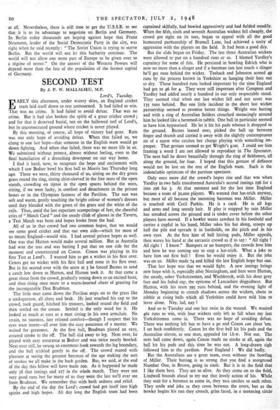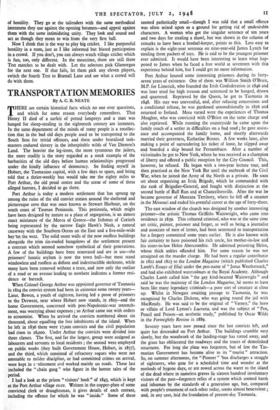SECOND TEST
By J. P. W. MALLAL1EU, M.P.
Lord's, Tuesday.
EARLY this afternoon, under watery skies, an England cricket team laid itself down to rest unmourned. It had failed to win. That was no crime. It had failed to avoid defeat. That was no crime. But it had also broken the spirit of a great cricket crowd ; and for that it deserved burial, not on the hallowed turf of Lord's, but in unconsecrated ground where cricket is never played.
By this morning, of course, all hope of victory had gone. Rain was our only hope of avoiding defeat. When that failed us, we clung to one last hope—that someone in the English team would go down fighting. And when that failed, there was no more life in us. We submitted without protest, almost without feeling, even to the final humiliation of a drenching downpour on our way home.
I find it hard, now, to recapture the hope and excitement with which I saw Bedser bowl his first ball to Morris last Thursday long ago. There we were, thirty thousand of us, sitting on the dry green grass round the ring, sitting shirt-sleeved in the free seats of the open stands, crowding on tiptoe in the open spaces behind the seats, sitting, if we were lucky, in comfort and detachment in the private boxes or in the Olympian fastness of the Pavilion. The sun was soft and warm, gently touching the bright colour of women's dresses until they blended with the green of the grass and the white of the rails. Thus, amid the last expectant scamperings of feet, the cheerful cries of " Match Card " and the steady clink of glasses in the Tavern, a Test Match was born and hopes broke from the bud.
All of us in that crowd had two common hopes, that we would see some good cricket and that our own side—which for most of us meant England—would win. I had several private hopes as well. One was that Hutton would make several million. But as Australia had won the toss and was batting I put that on one side for the moment and concentrated on Coxon. Coxon was playing in his first Test at Lord's. I wanted him to get a wicket in his first over. Coxon got no wicket with his first ball and none in his first over. But in his second over with the score at 3 he forced Barnes to send a catch low down to Hutton, and Hutton took it. At that came a great shout from the crowd, gradually toning down to an excited buzz, and then rising once more to a warm-hearted cheer of greeting for the incomparable Don Bradman.
The little man came down the Pavilion steps on to the grass like a cocksparrow, all chest and beak. He just touched his cap to the crowd, took guard, hitched his trousers, looked round the field and then settled on the crease. Settled is the only word for it. He looked as much at ease as a man sitting in his own armchair. No strain, no tautness, just relaxed comfort—though I suspect that his eyes were intent—all over him the easy assurance of a master. We waited for greatness. At the first ball, Bradman played an easy, assured stroke to the off. The ball slid away to leg. Next over, he played with easy assurance at Bedser and was twice nearly bowled. Next over still, he swung an enormous hook towards the leg boundary, and the ball trickled gently to the off. The crowd roared with pleasure at seeing the greatest batsman of the age making the sort of strokes we all make in the back garden. But, we said, at the end of the day this fellow will have made 200. As it happened he made only 38 that innings and 127 in the whole match. They were not very good runs but for many of us they were the last we'll ever see from Bradman. We remember that with• both sadness and relief.
By the end of the day the Lord's crowd had got itself into high spirits and high hopes. All day long the English team had been captained skilfully, had bowled aggressively and had fielded steadily. When the fifth, sixth and seventh Australian wickets fell cheaply, the crowd got right on its toes, began to appeal with all the good humoured partisanship of Bramall Lane, had achieved a unity of aggression with the players on the field. It had been a good day.
But the slide began on Friday. The last three Australian wickets were allowed to put on a hundred runs or so. I blamed Yardley's captaincy for some of this. He persisted in bowling Edrich who is now no more than a slinger and if a batsman can just touch a slinger he'll get runs behind the wicket. Toshack and Johnston scored 49 runs by the process known in Yorkshire as hanging their bats out to dry. Those hundred runs looked important by the time England had got to 46 for 4. They were still important after Compton and Yardley had added nearly a hundred in our only respectable stand.
They seemed vital when our last wicket fell and our score was 135 runs behind. But one little incident in the short last wicket partnership seemed to promise better things. Wright was batting and with a ring of Australian fielders crouched menacingly around him he looked like a hemmed-in rabbit. One ball in particular seemed to have him hypnotised. He let it hit his pads whence it dropped to the ground. Barnes leaned over, picked the ball up between finger and thumb and carried it away with the slightly contemptuous air of a nurse who catches her charge playing with something im- proper. That gesture seemed to get Wright's goat. I could see him framing a word I am not allowed to reproduce in The Spectator.
The next ball he drove beautifully through the ring of fieldsmen, all along the ground, for four. I hoped that this gesture of defiance would not be lost on the rest of the English team. Such is the indomitable optimism of the partisan spectator.
Only once more did the crowd's hopes rise and that was when Yardley in two balls transformed Australia's second innings 296 for I into 296 for 3. At that moment and for the last time England became a team of 30,000 players. We wanted that hat-trick anyway, but most of all because the incoming batsman was Miller. Miller is touched with Cecil Parkin. He is a card. He is all legs and arms and long unruly hair. If play is stopped by rain Miller has streaked across the ground and is under cover before the other players have moved. If a bowler wants sawdust in his foothold and carries a cupful in his hand, Miller takes his bat along, scoops up half the pile and spreads it in footholds, on the pitch and in his own eyes. At the first hint of ball hitting pads, Miller appeals, then waves his hand at the sarcastic crowd as if to say: " All right !
All right ! I know." Bumpers or no bumpers, the crowds love him and here he was coming out to stop a hat-trick. What a joke to have him out first ball ! Even he would enjoy it. But the joke was on us. Miller made 74 and killed the last English hope but one. That last hope was that we would fight. A new innings brings new hope with it, especially after Nottingham, and here were Hutton, the steady, sober Yorkshireman, and Washbrook, with his dour grey face and his faded cap, the epitome of Lancashire doggedness. But Hutton, with his team 595 runs behind, and the evening light of Monday beginning to stretch shadows across the wickets, chose to nibble at rising balls which all Yorkshire could have told him to leave alone. Nay, lad, nay !
And so to Tuesday and one last twist in the wound. We wanted 461 runs to win, with four wickets only left to fall when my last Yorkshireman came in. There was no hope of avoiding defeat.
There was nothing left but to have a go and Coxon can clout 'em. I sat back confidently. Coxon let the first ball hit his pads and the Australian eleven, as one man, appealed for 1.b.w. Not out. The next ball came down, again Coxon made no stroke at all, again the ball hit his pads and this time he was out. A long-drawn sigh followed him to the pavilion. Poor England ! We did badly.
But the Australians are a great team, even without the bowling of Miller. Their batting, is so strong that you find a recognised Number One, in Brown, going in sixth. But it is in the field that I like them best. They are so alive. As they come on to the field, Lindwall bounds ahead to try out that lovely action of his. While they wait for a batsman to come in, they toss catches to each other. They smile and joke as they cross between the overs, but as the bowler begins his run they crouch, grim faced, in a menacing circle of hostility. They go at the tailenders with the same methodical intentness they use against the opening batsmen—and appeal against them with the same intimidating unity. They look and sound and act as though they mean to win from the very first ball.
Now I think that is the way to play big cricket. I like purposeful hostility in a team, just as I like informed but biased participation in a crowd. If you don't, you can always watch village cricket which is fun, too, only different. In the meantime, there are still three Test matches to be dealt with. Let the selectors pick Glamorgan for the next one. If that fails, let them pick any eleven players, switch the fourth Test to Bramall Lane and see what a crowd will do 'with them.







































 Previous page
Previous page